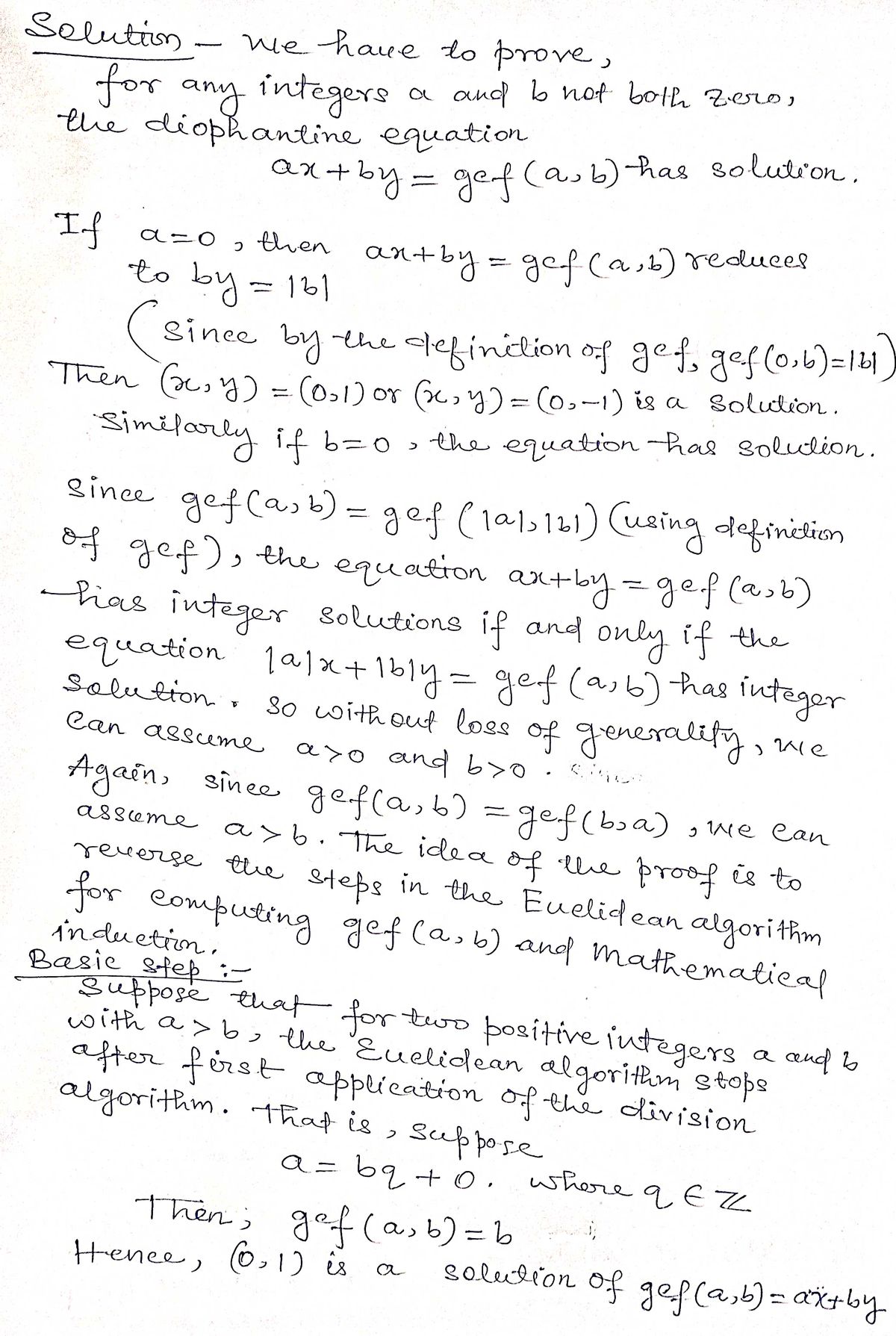Theorem 5.6 For any integers a and b not both zero, the Diophantine equation ax + by gcf(a, b) = has solutions. Partial proof: If a = 0, then ax + by gcf(a, b) reduces to by= b). Then (x, y) = (0, 1) or (x, y) = (0, -1) is a solution. Similarly, if b= 0, the equation has solutions. Since gef(a, b) = gef(a, b), the equation ax + by gcf(a, b) has integer solutions if and only if the equation ax + bly = gcf(a, b) has integer solu- tions. So we can assume a > 0 and b>0. Since gef(a, b) = gef(b, a), we can assume a > b. The idea of the proof is to reverse the steps in the Euclidean Algo- rithm for computing gef(a, b). For example, suppose that for two positive integers a and b with a >b, the Euclidean Algorithm stops after four applications of the Division Algorithm. That is, suppose and bq₁ + ₁ b = 11₁92 + 1₂ 7293 + 1₂ 7₂ + 0.
Theorem 5.6 For any integers a and b not both zero, the Diophantine equation ax + by gcf(a, b) = has solutions. Partial proof: If a = 0, then ax + by gcf(a, b) reduces to by= b). Then (x, y) = (0, 1) or (x, y) = (0, -1) is a solution. Similarly, if b= 0, the equation has solutions. Since gef(a, b) = gef(a, b), the equation ax + by gcf(a, b) has integer solutions if and only if the equation ax + bly = gcf(a, b) has integer solu- tions. So we can assume a > 0 and b>0. Since gef(a, b) = gef(b, a), we can assume a > b. The idea of the proof is to reverse the steps in the Euclidean Algo- rithm for computing gef(a, b). For example, suppose that for two positive integers a and b with a >b, the Euclidean Algorithm stops after four applications of the Division Algorithm. That is, suppose and bq₁ + ₁ b = 11₁92 + 1₂ 7293 + 1₂ 7₂ + 0.
Advanced Engineering Mathematics
10th Edition
ISBN:9780470458365
Author:Erwin Kreyszig
Publisher:Erwin Kreyszig
Chapter2: Second-order Linear Odes
Section: Chapter Questions
Problem 1RQ
Related questions
Question
problem 7

Transcribed Image Text:7. Complete the proof of Theorem 5.6 by following the plan
suggested by the partial proof in this section.

Transcribed Image Text:Theorem 5.6 For any integers a and b not both zero, the Diophantine equation
ax + by gcf(a, b)
=
has solutions.
Partial proof: If a = 0, then ax + by gcf(a, b) reduces to by= b). Then
(x, y) = (0, 1) or (x, y) = (0, -1) is a solution. Similarly, if b= 0, the equation
has solutions. Since gef(a, b) = gef(a, b), the equation ax + by = gef(a, b) has
integer solutions if and only if the equation lalx + [bly = gcf(a, b) has integer solu-
tions. So we can assume a > 0 and b>0. Since gef(a, b) = gef(b, a), we can
assume a > b. The idea of the proof is to reverse the steps in the Euclidean Algo-
rithm for computing gef(a, b). For example, suppose that for two positive integers
a and b with a >b, the Euclidean Algorithm stops after four applications of the
Division Algorithm. That is, suppose
bq₁ + ₁
b == 1192 + 1₂
r₂ = 1293 + 1₂
and ₂7394 +0,
where all the q, and r are integers, and 0 <+1 <r for all i. Then
gcf(a, b) = 13₁-1293
=41- (b-192)93
= a - bq₁bg + (a - bq₁)9293
= a(1 + 9293) + b(-9₁ 93 − 919293).
Thus, gef(a,b) = ax + by, where x = 1 +929, and y=-(9₁ +93 +919293).
Since all the q, are integers, we have found a solution to ax + by gcf(a, b).
Notice that the last three steps of the Euclidean Algorithm scheme for gcf(a, b)
are precisely the Euclidean Algorithm scheme for gcf(b, r). Thus our calculation
shows that
= 1 +9293.
gcf(b, r₁) = v= bx' + r₁y' where x' = -q, and y'
Now, by using (*) and the first step of the scheme, we obtain
gef(a, b) = gef(b, r₁) = v= bx' + (a - bq₁)y' = ay' + b(x' - q₁y')
= ax + by.
Thus, we have not only proved the theorem for the case in which the Euclidean
Algorithm terminates after four applications of the Division Algorithm, but also we
have shown how to prove the theorem for this case from the case in which it
Unit 5.2 1 Divisibility Properties of the Integers 215
terminates in three applications of the Division Algorithm. This sets the stage for
a general proof by mathematical induction. You are asked to supply the details of
the proof in Problem 7.
We now use Theorem 5.6 to derive a very basic divisibility result.
Expert Solution
Step 1

Trending now
This is a popular solution!
Step by step
Solved in 4 steps with 4 images

Recommended textbooks for you

Advanced Engineering Mathematics
Advanced Math
ISBN:
9780470458365
Author:
Erwin Kreyszig
Publisher:
Wiley, John & Sons, Incorporated

Numerical Methods for Engineers
Advanced Math
ISBN:
9780073397924
Author:
Steven C. Chapra Dr., Raymond P. Canale
Publisher:
McGraw-Hill Education

Introductory Mathematics for Engineering Applicat…
Advanced Math
ISBN:
9781118141809
Author:
Nathan Klingbeil
Publisher:
WILEY

Advanced Engineering Mathematics
Advanced Math
ISBN:
9780470458365
Author:
Erwin Kreyszig
Publisher:
Wiley, John & Sons, Incorporated

Numerical Methods for Engineers
Advanced Math
ISBN:
9780073397924
Author:
Steven C. Chapra Dr., Raymond P. Canale
Publisher:
McGraw-Hill Education

Introductory Mathematics for Engineering Applicat…
Advanced Math
ISBN:
9781118141809
Author:
Nathan Klingbeil
Publisher:
WILEY

Mathematics For Machine Technology
Advanced Math
ISBN:
9781337798310
Author:
Peterson, John.
Publisher:
Cengage Learning,

